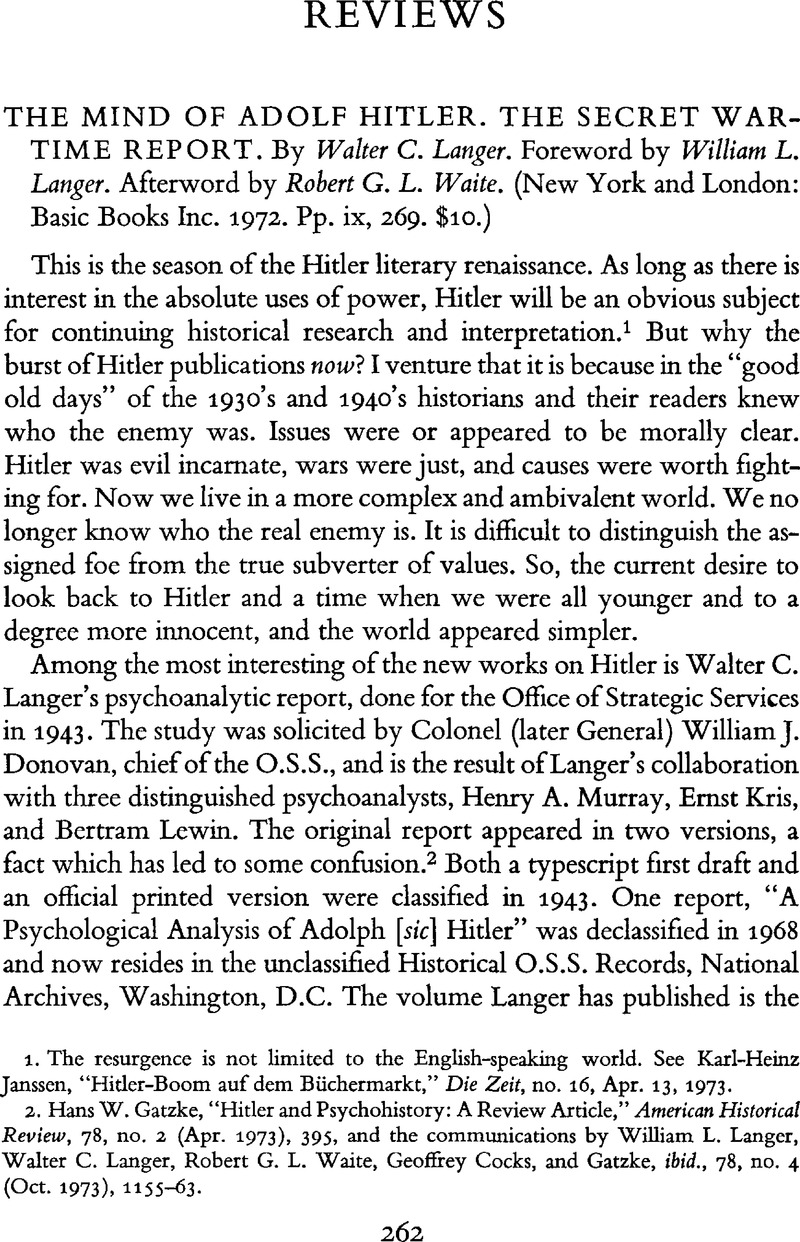No CrossRef data available.
Article contents
THE MIND OF ADOLF HITLER. THE SECRET WAR-TIME REPORT. By Walter C. Langer. Foreword by William L. Langer. Afterword by Robert G. L. Waite. (New York and London: Basic Books Inc.1972. Pp. ix, 269. $10.)
Published online by Cambridge University Press: 16 December 2008
Abstract

- Type
- Reviews
- Information
- Copyright
- Copyright © Conference Group for Central European History of the American Historical Association 1974
References
1. The resurgence is not limited to the English-speaking world. See Janssen, Karl-Heinz, “Hitler-Boom auf dem Büchermarkt,” Die Zeit, no. 16, 04 13, 1973.Google Scholar
2. Gatzke, Hans W., “Hitler and Psychohistory: A Review Article,” American Historical Review, 78, no. 2 (04 1973), 395,CrossRefGoogle Scholar and the communications by William L. Langer, Walter C. Langer, Robert G. L. Waite, Geoffrey Cocks, and Gatzke, ibid., 78, no. 4 (Oct. 1973), 1155–63.
3. By fantasy I mean conscious or unconscious mental activity that expresses forbidden wishes or defends against inner or outer dangers. Unconscious fantasies have a psychic reality of their own due to the lack of external reality testing and logical evaluations. Sigmund Freud's greatest contribution to sophistication of historical method was the yet unassimilated insight “that the neurotic symptoms were not related directly to actual events but to wishful phantasies, and that as far as the neurosis was concerned psychical reality was of more importance than material reality.” “An Autobiographical Study” (1925), Standard Edition of the Complete Psychological Works, trans. and ed. Strachey, James et al. (London, 1959), XX, 34.Google Scholar
4. Gatzke, pp. 397–98.
5. Hitler, Adolf, Mein Kampf, 241st–245th ed. (Munich, 1937), p. 2.Google Scholar
6. ibid., p. 26.
7. ibid., p. 27.
8. ibid., p. 28.
9. Langer, p. 144. This section of the book, pp. 141–45, is a model of psychoanalytic interpretation of a primary autobiographical text. Erikson, Erik H. also uses this technique of interpreting the latent autobiographical message in Mein Kampf with great virtuosity in “The Legend of Hitler's Childhood,” Childhood and Society, 2nd ed. (New York, 1963), pp. 326–58.Google Scholar
10. Hitler, Mein Kampf, pp. 32–33.
11. Gatzke, p. 397.
12. Gatzke, p. 398.
13. Smith, Bradley F., Adolf Hitler: His Family, Childhood and Youth (Stanford, Calif., 1967), pp. 43–44.Google Scholar
14. Ibid., p. 44.
15. Ibid., p. 45.
16. Fenichel, Otto, The Psychoanalytic Theory of Neurosis (New York, 1945), pp.214–15.Google Scholar
17. For a classic first-person description of a sadistic primal scene fantasy which was later confirmed by documentary evidence and testimony by one of the principals, see Bonaparte, Marie, “Notes on the Analytic Discovery of a Primal Scene,” Psychoanalytic Study of the Child, I (New York, 1945), 119–25.Google Scholar
18. Bracher, Karl Dietrich, The German Dictatorship: The Origins, Structure, and Effects of National Socialism, trans. Steinberg, Jean (New York, 1970), p. 58.Google Scholar
19. Frank, Hans, Im Angesicht des Galgens: Deutung Hitlers und seiner Zeit auf Grund eigener Erlebnisse und Erkenntnisse (München-Gräfelfing, 1953), pp. 320–30.Google Scholar See also Jetzinger, Franz, Hitlers Jugend (Zurich, 1956);Google ScholarMaser, Werner, Adolf Hitler: Legende, Mythos, Wirklichkeit, 4th ed. (Munich, 1973); Bradley Smith, Hitler, pp. 157–60.Google Scholar
20. For an exploration of the meanings and consequences of Hitler's fantasy that he was part Jewish, see Waite, Robert G. L., “Adolf Hitler's Guilt Feelings: A Problem in History and Psychology,” Journal of Interdisciplinary History, I, no. 2 (Winter 1971),229–49.Google Scholar
21. One noted British historian gives us his fantasies of professional displacement and personal irrelevance: “If historians cannot find something more profitable to argue about than Hitler's motivations … they have only themselves to blame if they waken up one morning and find their place taken by the psychiatrist's couch.” Barraclough, Geoffrey, “Psycho-history is bunk,” The Guardian (Manchester and London), 03 3, 1973;Google Scholar see also Trevor-Roper, H. R., in Book World, WashingtonPost, 09 10, 1972,Google Scholar and Die Zeit, no. 16, 04 13, 1973.Google Scholar
22. Freud, Sigmund, “My Views on the Part Played by Sexuality in the Aetiology of the Neuroses” (1906), Standard Edition, VII, 271.Google Scholar
23. Reik, Theodor, Masochism in Sex and Society, trans. Beigel, Margaret H. and Kurth, Gertrud M. (New York, 1962), p. 298.Google Scholar
24. Maser, Hitler, p. 320.
25. ibid., p. 324.
26. ibid., pp. 431–38.
27. ibid., pp. 319–20.
28. Hitler, Mein Kampf, p. 357.
29. Langer, p. 193.
30. Bezymenski, Lev, The Death of Adolf Hitler: Unknown Documents from Soviet Archives (New York, 1968).Google Scholar
31. Langer, pp. 134, 168.
32. Langer, p. 171.
33. Waite, Robert G. L., “Adolf Hitler's Anti-Semitism: A Study in History and Psychoanalysis,” in Wolman, Benjamin B., ed., The Psychoanalytic Interpretation of History (New York, 1971, 1973), pp. 192–230, esp. 225–28, n. 63.Google Scholar
34. Binion, Rudolph, “Hitler's Concept of Lebensraum: The Psychological Basis,” History of Childhood Quarterly: The Journal of Psychohistory, I, no. 2 (Fall 1973), 189, 203.Google Scholar
35. Langer, p. 195.
36. Trevor-Roper, writes: “It is true, the author predicts that Hitler, besieged and cornered, would commit suicide; but to forsee that requires no psychoanalysis: Hitler himself often enough said he would kill himself in such a situation,” Die Zeit, no. 16, Aprl 13, 1973. Hitler also said many other things and made many other pledges which he did not keep.Google Scholar
37. Speer, Albert, Inside the Third Reich: Memoirs, trans. Richard, and Winston, Clara (New York, 1970), pp. 403, 453, 467–70.Google Scholar
38. Langer, pp. 212–13.
39. ibid., p. 212.
40. Bracher, German Dictatorship, p. 63.
41. ibid., p. 60.
42. Waite, in Langer, p. 232.




